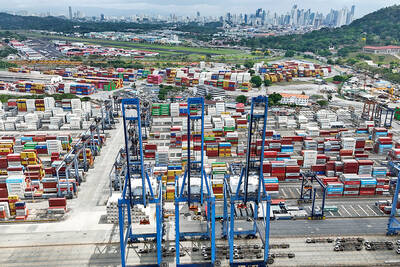The Australian Department of Defence is to strip its buildings of Chinese-made security cameras to ensure they are “completely secure,” the government said yesterday.
It follows similar moves in the US and Britain, which have taken measures to stop government departments installing Chinese-made cameras at sensitive sites.
Both countries have expressed fears that Chinese companies could be forced to share intelligence collected by the cameras with Beijing’s security services.
At least 913 Chinese-made cameras have been installed across more than 250 Australian government buildings, official figures compiled by Australian Senator James Paterson showed.
This includes offices and facilities belonging to the departments of defense, foreign affairs, finance and the attorney general.
Australian Minister for Defence Richard Marles said officials would hunt down and remove all Chinese-made security cameras within its buildings.
“It’s a significant thing that’s been brought to our attention and we’re going to fix it,” he told national broadcaster ABC. “It’s important that we go through this exercise and make sure that our facilities are completely secure.”
The government-funded national War Memorial — a 14-hectare complex in the capital, Canberra — also confirmed it would remove a small number of Chinese-made cameras through an “abundance of caution.”
Other government agencies declined to comment, or referred back to Marles’ statements. Paterson, a vocal critic of the Chinese government, had said Australian government buildings were “riddled” with “spyware” and that every Chinese-made camera should be urgently ripped out.
The cameras were made by companies Hikvision and Dahua, which have been blacklisted in the US for allegedly helping the Chinese government carry out a “campaign of repression.”
The two companies have been implicated in the “high-technology surveillance” of the Uighur minority in the Xinjiang region, the US Department of Commerce said.
The US banned the importation of surveillance equipment made by the two firms in November last year, because it posed “an unacceptable risk to national security.”
In Britain, a group of 67 lawmakers and lords called for the government to ban Hikvision and Dahua in July last year, following reports their equipment had been used to track Uighurs.
It was a Hikvision CCTV camera that caught former British secretary of state for health and social care Matt Hancock kissing an aide in contravenion of COVID-19 rules in June 2021, leading to his resignation.
Hikvision said it was “categorically false” to paint the company as “a threat to national security.”
“No respected technical institution or assessment has come to this conclusion,” the company said in a statement. “Our products are compliant with all applicable Australian laws and regulations and are subject to strict security requirements.”
Australia in 2018 was one of the first countries in the world to block Chinese telecoms Huawei from its 5G cellphone network.
Former Australian prime Minister Malcolm Turnbull, who made the decision, said it would help Australia “defend our own sovereignty.”
Similar Huawei bans are now in place in the US, Britain and Canada — which, along with New Zealand and Australia, form the secretive Five Eyes spying alliance.

THE TRAGEDY OF PUNCH: Footage of the seven-month-old Japanese macaque has gone viral online after he was rejected by his mother and formed a bond with a soft toy A baby monkey in Japan has captured hearts around the world after videos of him being bullied by other monkeys and rejected by his mother went viral last week. Punch, a Japanese macaque, was born in July last year at Ichikawa City Zoo. He has drawn international attention after zookeepers gave him a stuffed orangutan toy after he was abandoned by his mother. Without maternal guidance to help him integrate, Punch has turned to the toy for comfort. He has been filmed multiple times being dragged and chased by older Japanese macaques inside the enclosure. Early clips showed him wandering alone with

Australian Prime Minister Anthony Albanese yesterday said he did not take his security for granted, after he was evacuated from his residence for several hours following a bomb threat sent to a Chinese dance group. Albanese was evacuated from his Canberra residence late on Tuesday following the threat, and returned a few hours later after nothing suspicious was found. The bomb scare was among several e-mails threatening Albanese sent to a representative of Shen Yun, a classical Chinese dance troupe banned in China that is due to perform in Australia this month, a spokesperson for the group said in a statement. The e-mail

TENSIONS: The march went ahead without clashes, but arrests were still possible as police investigate suspects behind Nazi salutes, racist slurs and homophobic insults Thousands of people on Saturday marched in southeastern France under heavy security in tribute to a far-right activist whose killing, blamed on the hard left, has put the country on edge. The crowd — many wearing black and some covering their lower faces with masks — marched through the city of Lyon carrying flowers and placards bearing pictures of Quentin Deranque and the words: “justice for Quentin” and “the extreme left kills.” The 23-year-old died from head injuries following clashes between radical left and far-right supporters on the sidelines of a demonstration against a politician from the left-wing France Unbowed

‘OCCUPATION’: Hong Kong said it had lodged ‘stern protests’ with Panama’s consulate, and would ‘staunchly support’ the rights and interests of Hong Kong companies Panamanian President Jose Raul Mulino on Monday ordered the temporary occupation of two ports run by a unit of CK Hutchison Holdings Ltd following the Supreme Court’s ruling against the firm’s concession, escalating a dispute that has become a proxy battle between the US and China in Latin America. Mulino said in a speech that the administration and operation of the two ports on the strategic Panama Canal is to revert to the country’s National Maritime Authority to ensure their uninterrupted, safe and efficient operation. The occupation covers movable equipment at the ports and does not mean a definitive loss of